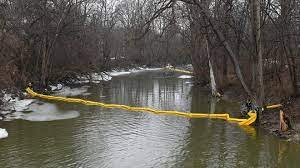Check out a handful of articles about recent water and environmental news, including the release of the new United Nations Intergovernmental Panel on Climate Change report, an oil spill in the Huron River near Flat Rock, new investments in environmental protection and restoration, and emerging research on watershed PFAS loading.
Floods, heat waves, crop failures: Report shows Michigan must prepare for climate future
The latest United Nations Intergovernmental Panel on Climate Change report on climate impacts, adaptation, and vulnerability discusses the current and future human toll of climate change. The 3,500-page report details how climate change impacts cities, food production, and indigenous communities. The report’s contributors include researchers from the University of Michigan, who say climate effects are already felt across Michigan.
Read HRWC’s recently published Detroit Free Press Opinion: Protecting Michigan’s natural resources can combat climate change. By Rebecca Esselman, Executive Director and Daniel Brown, Watershed Planner.
Listen to HRWC’s interview on the IPCC’s urgent call to action with David Fair on WEMU. Issues of the Environment: IPCC Climate Report has dire warning with consequences to impact Huron River Watershed. Featuring Daniel Brown, Watershed Planner.

Flat Rock’s second chemical spill points to hazards of underground tanks
In late February, an oil leak was identified in the Lower Huron River near Flat Rock for the second time in six months. Investigators believe the likely culprit is an aged underground storage tank from a former Ford Motor Company site. The recurring Flat Rock oil spills reveal the challenges with aging buried fuel tanks and the threat they post to water quality. Despite regulation of underground storage tanks by the Environmental Protection Agency since the 1980s, many tanks remain underground and forgotten about until leaks occur.
Infrastructure plan gives $1B for Great Lakes cleanup
In a recent trip to the Great Lakes region, President Joe Biden discussed the $1 billion from the bipartisan infrastructure deal to be invested in cleaning up polluted Great Lakes harbors and tributaries. The funding will help complete work on the restoration of the 25 remaining U.S. Areas of Concern, which were designated as toxic hot spots in 1987. Federal agencies aim to complete work on 88% of the remaining Areas of Concern by 2030.
Southeast Michigan Resilience Fund awards $1.6 Million to improve community and habitat resilience
$1.6 million in grant funding from the National Fish and Wildlife Foundation’s Southeast Michigan Resilience Fund was recently awarded to seven projects across southeast Michigan. The funded projects aim to improve water quality and community resilience through green infrastructure and habitat restoration. A number of the projects will be implemented within the Huron River watershed, including a prairie restoration at Riggs Heritage Park in Van Buren Township and rain garden installations in Ypsilanti Township.
Tributaries play key role in feeding ‘forever chemicals’ into Great Lakes: study
A new study from the University of Wisconsin-Madison reveals tributary rivers play a critical role in transporting perfluoroalkyl acids (PFAAs), a type of PFAS chemical, to the Great Lakes. The research improves understanding of Great Lakes PFAS loading, indicating that both tributary discharge and riverbed sediments may act as a source of PFAAs.



